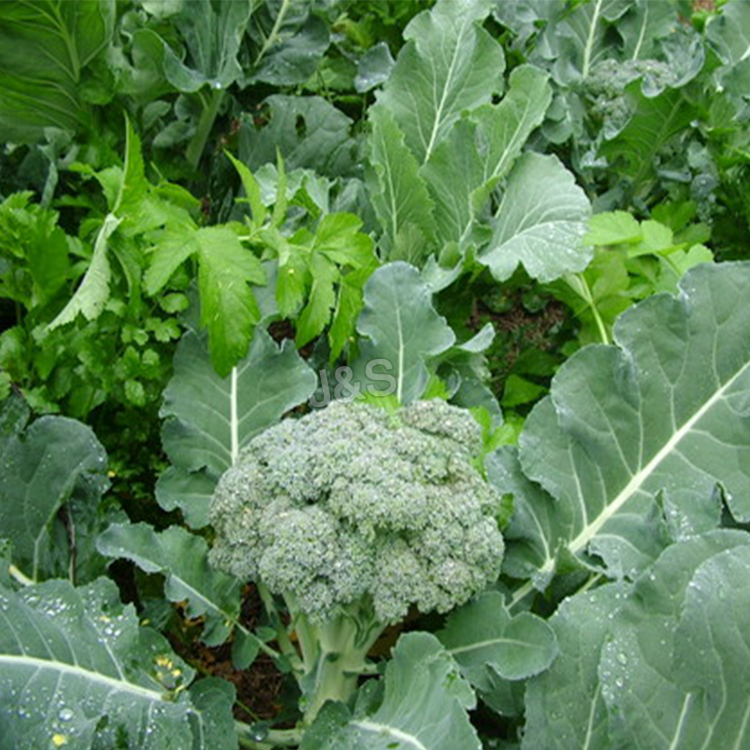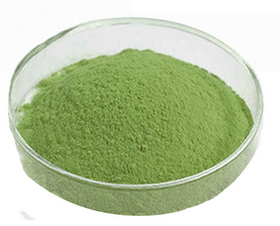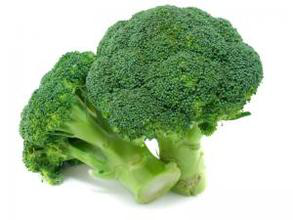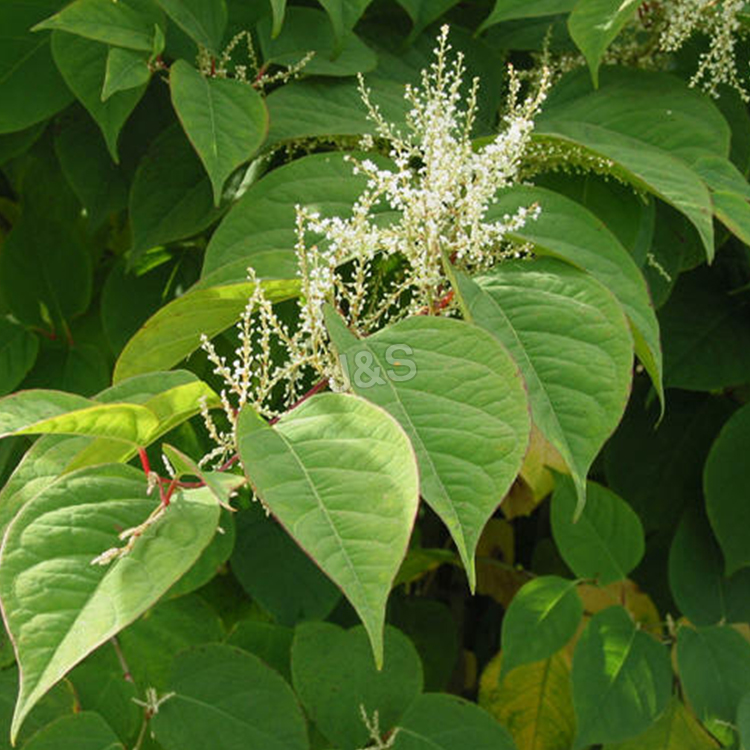Leading Manufacturer for Broccoli powder Factory from Cannes
Leading Manufacturer for Broccoli powder Factory from Cannes Detail:
[Latin Name] Brassica oleracea L.var.italica L.
[Plant Source] from China
[Specifications]10:1
[Appearance] Light green to green powder
Plant Part Used: whole plant
[Particle size] 60 Mesh
[Loss on drying] ≤8.0%
[Heavy Metal] ≤10PPM
[Storage] Store in cool & dry area, keep away from the direct light and heat.
[Shelf life] 24 Months
[Package] Packed in paper-drums and two plastic-bags inside.
[Net weight] 25kgs/drum
Broccoli is a member of the cabbage family, and is closely related to cauliflower. Its cultivation originated in Italy. Broccolo, its Italian name, means “cabbage sprout.” Because of its different components, broccoli provides a range of tastes and textures, from soft and flowery (the floret) to fibrous and crunchy (the stem and stalk). Broccoli contains glucosinolates, phytochemicals which break down to compounds called indoles and isothiocyanates (such as sulphoraphane). Broccoli also contains the carotenoid, lutein. Broccoli is an excellent source of the vitamins K, C, and A, as well as folate and fiber. Broccoli is a very good source of phosphorus, potassium, magnesium and the vitamins B6 and E.
Main Function
(1).With the function of anti-cancer, and effectively improving capability of blood scavenging;
(2).Having the great effect to prevent and regulate hypertension;
(3).With the function of enhancing liver detoxification, improve immunity;
(4).With the function of reducing blood sugar and cholesterol.
4. Application
(1).As drugs raw materials of anti-cancer, it is mainly used in pharmaceutical field;
(2).Applied in health product field, it can be used as raw material in health food, the purpose is to enhance immunity
(3).Applied in food fields, it is widely used as functional food additive.
Product detail pictures:

Related Product Guide:
We take pleasure in an extremely fantastic standing among the our prospects for our great product top quality, competitive cost and the finest support for Leading Manufacturer for Broccoli powder Factory from Cannes , The product will supply to all over the world, such as: Las Vegas, Anguilla, Borussia Dortmund, Selling our products and solutions causes no risks and brings high returns to your company instead. It is our consistent pursuit to create value for clients. Our company is looking for agents sincerely. What are you waiting for? Come and join us. Now or never.
Herbal medicine is the study and use of medicinal properties of plants. The scope of herbal medicine is sometimes extended to include fungal and bee products, as well as minerals, shells and certain animal parts. Pharmacognosy is the study of all medicines that are derived from natural sources.The bark of willow trees contains large amounts of salicylic acid, which is the active metabolite of aspirin. Willow bark has been used for millennia as an effective pain reliever and fever reducer.
Plants have the ability to synthesize a wide variety of chemical compounds that are used to perform important biological functions, and to defend against attack from predators such as insects, fungi and herbivorous mammals. Many of these phytochemicals have beneficial effects on long-term health when consumed by humans, and can be used to effectively treat human diseases. At least 12,000 such compounds have been isolated so far; a number estimated to be less than 10% of the total.Chemical compounds in plants mediate their effects on the human body through processes identical to those already well understood for the chemical compounds in conventional drugs; thus herbal medicines do not differ greatly from conventional drugs in terms of how they work. This enables herbal medicines to be as effective as conventional medicines, but also gives them the same potential to cause harmful side effects.
The use of plants as medicines predates written human history. Ethnobotany (the study of traditional human uses of plants) is recognized as an effective way to discover future medicines. In 2001, researchers identified 122 compounds used in modern medicine which were derived from “ethnomedical” plant sources; 80% of these have had an ethnomedical use identical or related to the current use of the active elements of the plant.[4] Many of the pharmaceuticals currently available to physicians have a long history of use as herbal remedies, including aspirin, digitalis, quinine, and opium.
The use of herbs to treat disease is almost universal among non-industrialized societies, and is often more affordable than purchasing expensive modern pharmaceuticals. The World Health Organization (WHO) estimates that 80 percent of the population of some Asian and African countries presently use herbal medicine for some aspect of primary health care. Studies in the United States and Europe have shown that their use is less common in clinical settings, but has become increasingly more in recent years as scientific evidence about the effectiveness of herbal medicine has become more widely available.
WIN, an acronym for
“What Is New”
is a comprehensive multimedia services package for maximum news distribution across several media channels via WIN TV, exclusively dedicated for New Media production and Broadcating
Allergic rhinitis is a common condition, affecting an estimated 10 to 20% of the US population. It is a type of allergic reaction that happens when your immune system overreacts to inhaled substances and the body releases chemicals that cause allergy symptoms.
Common allergens that can cause allergic rhinitis are tree and grass pollen. Other allergens include dust mites present in bedding, mold spores in the air and pet dander.
There are two types of allergic rhinitis –seasonal (known as hay fever) and perennial that occurs year-round. Symptoms include repeated sneezing, runny nose, itchy nose, nasal congestion and watery or swollen eyes.
It can also give rise to symptoms like sore throat, dry cough, headaches, fatigue, weakness and dark circles under the eyes.
Allergic rhinitis symptoms can affect the quality of life of the sufferers. To reduce symptoms, you can use some natural home remedies that are inexpensive and effective.
Here are some home remedies for allergic rhinitis.
1. Saline Water
One of the first steps to treat allergic rhinitis is to remove mucus from the nose with the help of a saline nasal wash.
1. Mix 1 teaspoon of salt and a pinch of baking soda in 2 cups of warm distilled water.
2. Using a nasal bulb, snort a small amount of this solution into one nostril.
3. Allow the solution to drain back out through the other nostril or through the mouth.
4. Gently blow your nose to remove excess mucus and solution.
5. Follow this same process with the other nostril.
6. Repeat this remedy a couple of times daily until your condition improves.
2. Steam
Inhaling steam on a regular basis will help clear the nasal passages of excess mucus and any irritants. This in turn will help get rid of allergic rhinitis symptoms, such as sneezing, runny nose and sore throat.
1. Pour boiling water in a big bowl.
2. Add 3 or 4 drops of any essential oil of your choice like eucalyptus, peppermint, rosemary or tea tree oil.
3. Cover your head with a towel and lean carefully over the bowl.
4. Deeply inhale the steam for 5 to 10 minutes, then blow your nose thoroughly.
5. Repeat several times a day until you recover completely.
3. Ginger
Ginger is another useful home remedy for allergic rhinitis. It works as a natural antihistamine and has antiviral, antibacterial, anti-inflammatory and immune-boosting properties that help relieve rhinitis symptoms like nasal congestion, runny nose, cough and even headache.
• Add 1 tablespoon of grated ginger, a few cloves and a small piece of cinnamon to 1 cup of water. Boil for 5 minutes, strain and add a little honey and lemon juice. Drink this herbal tea up to 3 times daily during the allergy season.
• Also, chew small pieces of fresh ginger several times a day as well as include ginger in your cooking.
4. Turmeric
To reduce the risk of any kind of allergy, turmeric is a good consideration. It is a powerful antioxidant and anti-inflammatory agent with immune-boosting properties. It can help reduce symptoms of allergic rhinitis like congestion, cough, dry mouth and sneezing.
• Prepare a mixture with 6 tablespoons each of turmeric powder and raw honey. Mix well and store it in an air-tight container. Have 1 teaspoon of this mixture 2 times daily during the allergy season.
• Alternatively, drink 1 glass of warm turmeric milk daily to keep your immune system strong.
• You can also use turmeric in your cooking or take turmeric supplements after consulting a doctor.
5. Garlic
Garlic contains quercetin, a natural antihistamine that can be very effective in treating allergic rhinitis. Plus, garlic has antibiotic, antibacterial, antiviral and immune-boosting properties that promote quick recovery.
• Chew 2 to 3 raw garlic cloves daily to combat the various symptoms of allergic rhinitis.
• Also include garlic powder or raw garlic in your day-to-day cooking
• People with a history of allergies can benefit from taking a garlic supplement daily during the allergy season. Consult your doctor for the correct dosage.
Please Like and Subscribe Us! Thank You
======================================================
The materials and the information contained on this channel are provided for general and educational purposes only and do not constitute any legal, medical or other professional advice on any subject matter. Always seek the advice of your physician or other qualified health provider. If you have or suspect that you have a medical problem, promptly contact your health care provider.
Images licensed under CC:
https://pixabay.com/
https://www.flickr.com/
https://commons.wikimedia.org/
Products and services are very good, our leader is very satisfied with this procurement, it is better than we expected,







